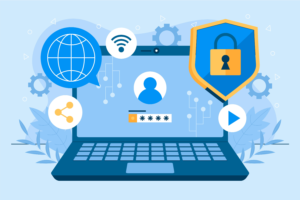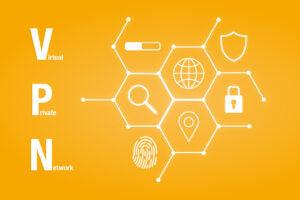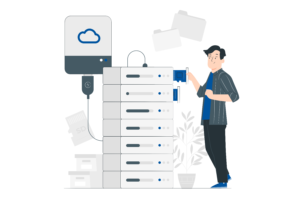Kategorie: ‘IT-Security’
How to Set up a Secure Home Network

Source: Freepik
More and more devices in our everyday lives are connected to the internet – from home offices and online banking to smart thermostats and surveillance cameras. And all these digital helpers access a common system: the home network. It forms the heart of our digital infrastructure at home. In this article, we explain what a home network is, what risks it poses, and how you can effectively protect it from attacks.
DNS at RWTH Aachen University Part 1:
History & Function of the DNS

Source: Freepik
The Domain Name System (DNS) makes the Internet usable by translating readable names such as rwth-aachen.de into IP addresses. It originated from simple lists of names and developed into a globally distributed, hierarchical system. Today, it fulfils many more tasks – for example in the areas of e-mail, IT security and network management. The DNS also plays a central role at RWTH Aachen University and is protected by modern technologies such as DNS firewalls. This article provides an overview of the origin, structure and current significance of the DNS.
Basics at RWTH: Using the VPN

Source: Own Illustration
At RWTH Aachen University, the Virtual Private Network (VPN) provides an important and secure connection to the university network. This connection is secured by encryption protocols such as TLS. VPN ensures that all data traffic – either to the RWTH network or, depending on the configuration, also to the Internet – is routed via a so-called “tunnel”. This tunnel protects the data on its way between your end device and the VPN server, where it is then integrated into the RWTH network. In the “Full Tunnel”, for example, requests from your device for external services appear with an IP address of RWTH Aachen University. In this article, we explain how you can set up and use the RWTH VPN service.
New Certification Authority: From Sectigo to Harica

Source: Own illustration
The time has come! Since April 1, 2025, user certificates (S/MIME) can again be requested in the RA-Portal. After our previous certificate provider, Sectigo, terminated its contract on January 10, 2025, we now have a new provider. The German Research Network (DFN) and GÉANT have contracted a new provider for public-key certificates. The choice fell on the Greek trusted provider HARICA (Hellenic Academic & Research Institutions Certification Authority). HARICA is a certification authority of the Greek university network GUnet, is specially optimized for research institutions and meets the highest security standards.
Effective Backup Strategies: Correct Data Backup

Source: Freepik
Backing up important professional or private files, such as texts, images and other documents, is essential. Data loss can have catastrophic consequences, whether caused by technical mishaps, accidental deletion or even hardware theft. Data loss can also be caused by viruses or hacker attacks. Viruses can, for example, encrypt the hard drive and then demand a ransom. Here are some proven strategies and tools to ensure that your data always remains safe and accessible. You can also take a look at the category IT-Security on our website to find out more tips.
IT Security When Traveling

Source: Freepik
Those who frequently use public transportation are often reminded to take care of their personal belongings. The material damage caused by theft or loss is obvious. The dangers of data theft are perhaps less apparent but have equally serious consequences. These consequences include identity theft, unauthorized access to financial data and potential damage to your personal and professional reputation.
With the right IT security tips, you can reliably protect your data on the move and travel with peace of mind. In this blog post, you can find out how to protect your data effectively – whilst enjoying every trip in peace.
The ITSSM Department in Focus: IT Services & IT Security

Source: Alexander Müller
The IT Service & Security Management (ITSSM) department plays a key role in the establishment, control and further development of IT service management processes and security processes in the IT center. The processes support service provision, service operations, IT security, reporting and support. In the following blog post, we take a closer look at the department’s areas of work.
Blockchain Technology

Source: Freepik
Blockchain technology, often referred to simply as ‘blockchain’, is transforming the way data is stored and secured. Originally developed as the basis for cryptocurrencies such as Bitcoin, it has quickly developed into a versatile technology that is used in numerous industries.
In this blog post, you can find out how it all works and what applications there are in general.
Digital Cleanup Day 2025

Source: Own illustration
The temperatures are rising and the first flowers are sprouting from the ground. That can only mean one thing: spring is here. And that means it’s time for the annual spring cleaning. But don’t just clean and declutter your home, do the same for your digital devices. Digital Cleanup Day on March 15 is a reminder to do a digital spring cleaning too.
DataStorage.nrw – How Do You Find out When Your Research Data Will Be Migrated?

Source: DataStorage.nrw
Preparations for the DataStorage.nrw connection are currently in full swing. Until the wait is over, we would like to prepare you for what the migration will look like for you on the Coscine platform. This way you can see at a glance whether your research data is currently being migrated.




